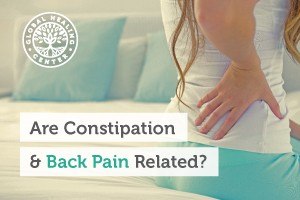
A member of our customer service team recently received feedback from a customer who had been experiencing such severe constipation that it was transitioning into lower back pain. This isn’t the first time I’ve heard a report like this. Soreness and lower back pain can definitely be related to constipation. It's not only severe constipation; even minor cases of constipation can lead to back pain.
Can Constipation Cause Back Pain?
Constipation occurs from obstructions in your system or from slow transit time through the colon. When back pain is a factor, obstructive constipation is usually to blame. Obstructive constipation is fairly self-descriptive; defecation is painful or halted due to a blockage. Although defecation stops, the traffic in the intestines does not. Just like a real-life traffic jam, it gets worse before it gets better. When blockage becomes significantly backed up, pressure on the lower back can increase, and pain can result. Since the body will continue to produce waste, the pain can increase if the impaction is not eliminated.
Sometimes trying to alleviate the concern can be a catch-22. By straining and trying to force your body to do something it’s already having a concern with, you can create more pressure and cause additional pain.
Can Back Pain Cause Constipation?
If you’ve ever experienced a pulled back muscle or chronic back pain, you know it can be extremely debilitating. Your back is central to your core. Most of your movement originates in the core area. When the back is hampered by sharp pain, every movement hurts and most movements are slow and avoided. The pain can even prevent you from making it out of bed. If it takes 20 minutes to make it up the stairs, isn’t it probable that straining during bowel movements could also be a source of misery?
It’s also not uncommon to see constipation in folks who have sustained back injuries from strenuous activities or lifting. In some cases, it’s simple — the lower back muscles spasm and interfere with the autonomic nerves responsible for the intestinal action that cause bowel movements.
A Secondary Influence
Back pain caused by constipation may have other contributing factors — such as medications. Chronic lower back pain is a common clinical concern, one of the most common in the nation, meaning that a lot of people who go to the clinic are going because their back hurts. Medications, in the form of pain relief drugs, prescription and not, and even antidepressants are commonly used to treat back pain.[1] Many medications, especially opioids (painkillers), can cause constipation.[2]
7 Things You Can Do
Eliminating the unpleasant experience of back pain and constipation is a journey. Many people can find relief by adopting simple lifestyle adjustments.
- Drink more water. Dehydration can exacerbate constipation.
- Consume extra fiber and enzymes from fresh fruits and vegetables.
- Get up and move. Sedentary habits make things settle; motion keeps things moving.
- Get a chiropractic adjustment.
- Try colon irrigation, acupuncture, or massage therapy. Try giving yourself an abdominal massage.
- Avoid using laxatives for occasional constipation. Instead, use a gentle, oxygen-based colon cleanser, such as Oxy-Powder®.
- Consider a full body cleanse. A system clogged with junk and toxins is not going to operate at peak efficiency, and chronic constipation is one possible result. Any comprehensive body cleanse should include a solid body cleansing diet.
References (2)
- Egbunike IG, Chaffee BJ. Antidepressants in the management of chronic pain syndromes. Pharmacotherapy. 1990;10(4):262-70. Review.
- Ohtori S, et al. Transdermal fentanyl for chronic low back pain. Yonsei Med J. 2012 Jul 1;53(4):788-793.
†Results may vary. Information and statements made are for education purposes and are not intended to replace the advice of your doctor. If you have a severe medical condition or health concern, see your physician.







